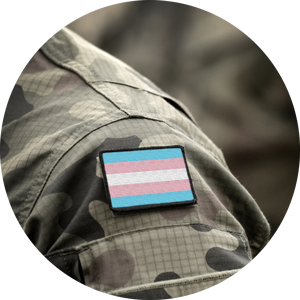News Briefs – FEBRUARY 2022
GLOBAL END-OF-LIFE CARE STUDY | PIG HEART TRANSPLANT | VETERAN GENDER IDENTITY

The U.S. Struggles With End-of-Life Care Quality
In a study evaluating the quality of end-of-life care among 81 countries, the United States ranked 43rd. The indicators that the U.S. scored poorly on include high costs, which act as a barrier to getting appropriate care; lack of help with nonmedical concerns; overtreatment of patients; and the delivery of clear and timely information so patients can make informed decisions. The U.S. measured well on indicators such as treating patients kindly; asking sufficient questions to determine patient needs; encouraging contact with friends and family; and providing care in a clean, safe, and comfortable environment.
The lower-ranking indicators conclude that the U.S. medical system expends too much energy on trying to keep people alive and not enough on helping people die peacefully, with a sense of dignity and grace. The study noted that the availability of hospice and palliative care does not guarantee a positive end-of-life care experience, but went on to say that such care can make a difference in ensuring equity of care.
The study was conducted by the Lien Centre for Palliative Care at the Duke-National University of Singapore Medical School. The researchers surveyed more than 1,200 primary caregivers who had lost a loved one to determine what patients valued most at the end of life. They then surveyed a group of 181 palliative care experts from around the world to grade their countries’ performance on the 13 indicators that the caregivers had identified most frequently.
The experts in developing countries stated that people at their end of life often died in pain, not in a place of their choice, and not even in clean and safe spaces. In the developed countries, the experts claimed that people at the end of life were under significant psychological and emotional distress and families were left with high medical bills and regrets.
The countries with the highest rankings in the report included the United Kingdom, Ireland, Taiwan, Costa Rica, the Republic of Korea, and Australia. The countries with some of the lowest rankings included Haiti, Senegal, Brazil, Lebanon, and Paraguay.
While the study did not look at the impact of end-of-life doula care on the dying experience, the areas in which the U.S. ranked poorly are areas in which end-of-life doulas can make a difference. Hopefully future studies like this may look at how end-of-life doulas can improve the experiences at end of life.
Man Receives Pig Heart: Controversy Heightens Awareness of Long Waiting Lists for Recipients
More than 41,000 kidney transplants were performed in the United States last year. Yet more than 100,000 people remain on the national waiting list, and about 12 people die each day waiting for a kidney transplant, according to the National Kidney Foundation. More than 5,000 heart transplants occur each year globally, although it is estimated that up to 50,000 people are candidates for a transplant. INELDA does not take a stance on xenotransplantation (animal to human transplants) and is reporting this story based upon lives lost waiting for kidney and heart transplants.
At the beginning of January, surgeons at the University of Maryland Medical Center completed the first successful transplant of a genetically modified pig heart into a human recipient, David Bennett. As of the writing of this article, Bennett was still alive and showed no signs of organ rejection. This operation marks a major milestone in the effort to transplant animal organs into humans, which could alleviate the scarcity of organs for people in need of a transplant.
The research team at the University of Maryland had previously applied to the Food and Drug Administration to do a clinical trial of pig hearts in humans, but were turned down. The FDA had wanted the researchers to transplant pig hearts into 10 baboons before moving on to people. However, the team received emergency use authorization when 57-year-old Bennett’s condition made it clear that he was not eligible for a human organ transplant and would certainly die without this trial. The research team is monitoring Bennett’s condition and continues to work toward controlled clinical trials.
Just a couple of weeks after the pig-to-human heart transplant, researchers at the University of Alabama at Birmingham reported on an experiment they conducted September 2021: transplanting a pig’s kidneys into a brain-dead man in a rehearsal for an operation they hope to try with living patients. By using a donor who was on life support, the research team was able to test how such a transplant operation could affect the patient’s life. For a little over three days, until the donor’s body was removed from life support, the pair of kidneys survived with no sign of rejection. One of the kidneys was damaged in removing it from the pig, but the other one functioned well and produced urine.
The scientists exploring animal to human transplantation say that there is still a great deal to learn about the genetic modification of pig organs and human recipients. They still don’t know if different organs require different modification or how long pig organs survive in humans.
Veterans’ Health Records Now Display Gender Identity
The Veterans Health Administration of the Department of Veterans Affairs has introduced new self-identifiers into their national medical record system. Now veterans have a broadened choice of gender expression, including: transgender male, transgender female, nonbinary, and other or does not wish to disclose. These identifiers will allow transgender, gender diverse, and intersex veterans to receive better health care and will alert health care providers to possible experiences of discrimination that can affect overall health.
In addition to the gender designations, the health system records will record the preferred name of the veterans to ensure that they are addressed appropriately. These changes further the agency’s commitment to inclusivity and honor the basic right of all veterans to be identified as they define themselves. Not recognizing gender identity has led some transgender veterans to avoid seeking the medical care they need. It has also been implicated in mental health issues and suicides among veterans.
The National Center for Transgender Equality estimates that 15,000 transgender people are serving in the military today and that 134,000 veterans identify as transgender. This change in the health records is part of an evolving response to transgender people in the military. In January of 2021, President Biden signed an executive order repealing the ban on transgender people serving openly. In the summer of 2021, the Department of Veterans Affairs announced it would offer gender confirmation surgery to veterans. It will take time to fully implement the latter two policy changes and develop the capacity to meet the surgical needs of transgender veterans. VA Secretary Denis McDonough acknowledges that “All Veterans, all people, have a basic right to be identified as they define themselves. This is essential for their general well-being and overall health. Knowing the gender identity of transgender and gender diverse veterans helps us better serve them.”

